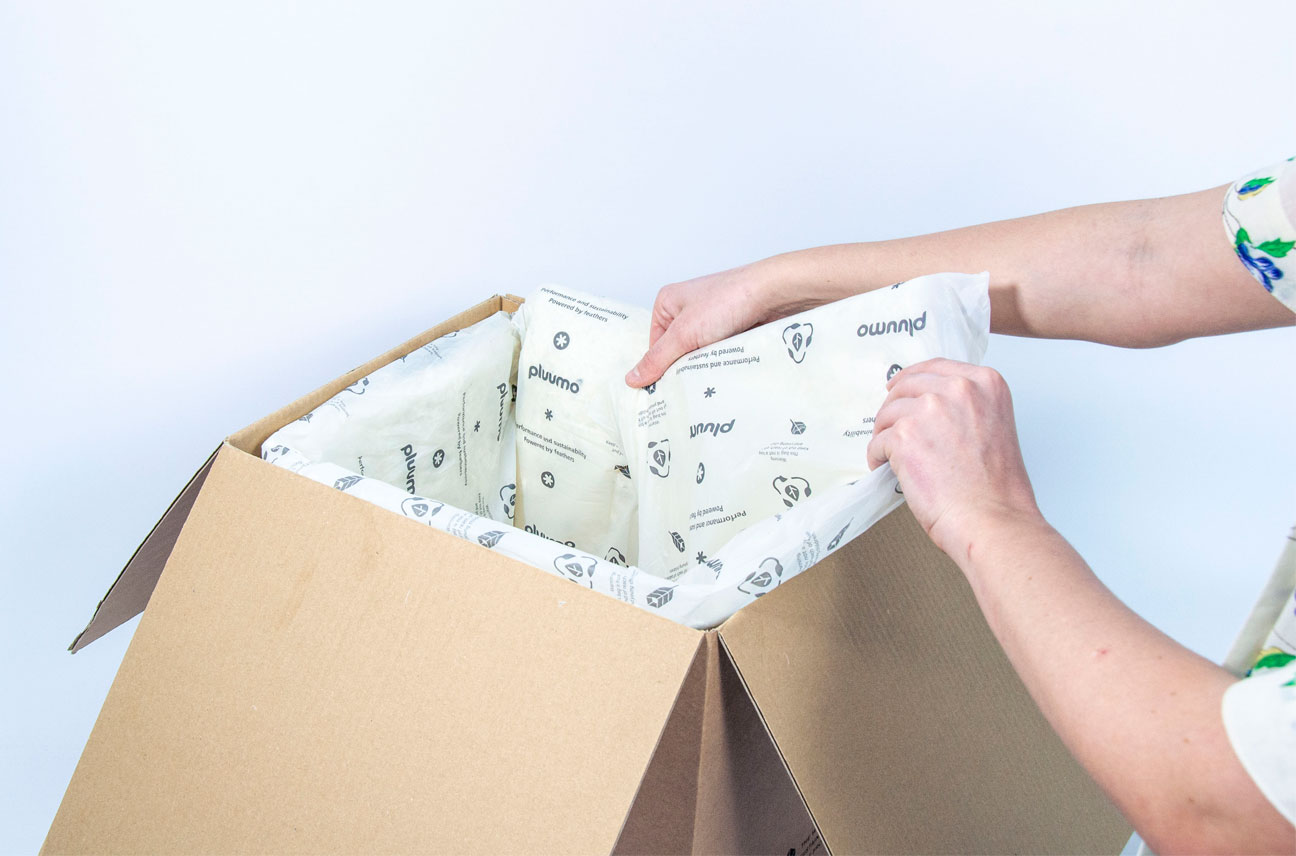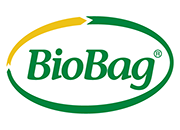NEW AND SUSTAINABLE PACKAGING FROM FEATHERS AND BIOPLASTIC
Posted on March 9, 2023 at 1:13 pm

London-based startup Aeropowder has shown the way by creating Pluumo – a high-performance insulation material, that not only makes better use of surplus feather waste, but also gives a sustainable alternative to packaging materials such as polystyrene.
Deliveries are playing an increasingly important role in our society. Packaging must be used to keep goods safe during transport. Especially temperature-sensitive items, like chilled food ingredients or pharmaceutical goods. Pluumo actually outperforms the required insulation performance of expanded polystyrene while being created from a natural waste material.
Wishing to make Pluumo fully compostable, Aeropowder contacted BioBag to test compostable and biodegradable film for the lining of the feather material.
Feathers and film
“Feathers are an incredible natural material, and we were thinking about how we could harness some of the existing properties and use them for useful things in our societies and economies. They could be used in the fight to avoid the use of plastic” CEO and co-founder of Aeropowder Ryan Robinson explains.
“We started with a practical mindset. The big picture question was initially: can we make a feather-based product, and will it insulate? To be honest, at the beginning the outer lining was not as critical. The insulation performance was the main thing we needed to understand. So, at first, we used a standard polyethylene liner – conventional and commonly used all around the world for many applications.”
Once Aeropowder figured those first questions out, they asked themselves: How do we move away from the traditional plastic material and move on to better alternatives? “This is when we came across the film from BioBag” Ryan says. “We wanted a fully compostable product.”
The biofilm is also an improvement compared to Aeropowder’s competitors, that are using a polyethylene lining and asking people to separate the product, if they want to recycle it. “End of life solutions are always tricky, and we want to make it as simple as possible for end users.” Ryan says.
“We also aim to make a product that has sensible pricing for our customers. But we are not here to race to the bottom. We make an exceptional product, especially from a performance perspective as we outperform not only expanded polystyrene but other more sustainable alternatives in the market. There is a lot of value in what we are doing, and that value can be transmitted from us along the chain with the client and end user.
There are plenty of people who want to pay for good quality and responsible sustainable packaging – and that is where we fit.”
Going for fully compostable
“When we looked at more sustainable film-based solutions the name BioBag came up pretty quickly.” Ryan says, “We were encouraged by the idea that BioBag already had a lot of experience from compostable food waste bags. Apart from the performance and sustainability, we liked the look and feel of the material.”
Pluumo gets a lot of positive feedback on this regard, which gives an element of actual quality and reassurance to end users. “The touch cannot be understated,” Ryan says and adds that a new client – a seafood company – is very enthusiastic about the look and feel and how it adds an element of quality and freshness to their delivery. “The lining obviously plays a big role in that as well” he says.
From a technical perspective, the film is sealing very well. There is no slowdown in production due to using compostable film, even though there were some concerns from other people saying to be careful when using these more compostable materials. “We have not found that at all – the film has a very strong seal and runs very smoothly on the machine. It has been a great benefit for us to know that it is technically possible.” Ryan concludes and continues “The biofilm helps Pluumo to stand out from the crowd on a very basic level.”
“BioBag was very helpful and flexible during the process of making it technically work with the compostable lining. We had several rolls of test film delivered and we were able to discuss different solutions along the way with BioBag, which was critically important to us.”
Although Pluumo currently does not have any formal biodegradable accreditation, they have had highly successful tests that confirm industrial compostability. The company is working on getting a biodegradable certification in the future, and to target home composting as well.
Aeropowder also works on a take-back-scheme where customers can return the product after use. But it must strike an economical balance and the technical facts must be understood. Currently, Aeropowder is looking into how the product survives in a reuse cycle. Will the outer lining be damaged? What is the hygiene perspective – can it be reused instantly, or does the product need to be put through a quality or cleaning process? When all this is settled, a take-back-scheme will be another contribution to the circular economy.
Value of waste mentality
“We must build a mentality and ask ourselves – what is the end of life of our products and materials? Can we reuse them or recycle them? Instead of burning or putting feathers to landfill, they can be useful and play a role in the circular economy.” Ryan says and continues “By using local waste materials, you have a more resilient supply chain rather than use materials that are transported from everywhere. From this mentality, Aeropowder has developed Pluumo.”
“We admit that what we are doing is a little bit crazy and out there, but this boldness and innovation will have a knock-on effect in demonstrating the potential of the circular economy. It could be a showcase of what can be done if you think outside the box. We have had some people tell us that what we are doing is impossible, but we are making it work.”
Ryan Robinson hopes that someone reads Aeropowder’s story and takes another look at waste material they have in their business. “That is how we fit in the circular economy – being practical and pioneers at the same time.”

No comments yet. If you want you can add one!
By submitting a comment you grant BioBag a perpetual license to reproduce your words and name/web site in attribution. Inappropriate and irrelevant comments will be removed at an admin’s discretion. Your email is used for verification purposes only, it will never be shared.